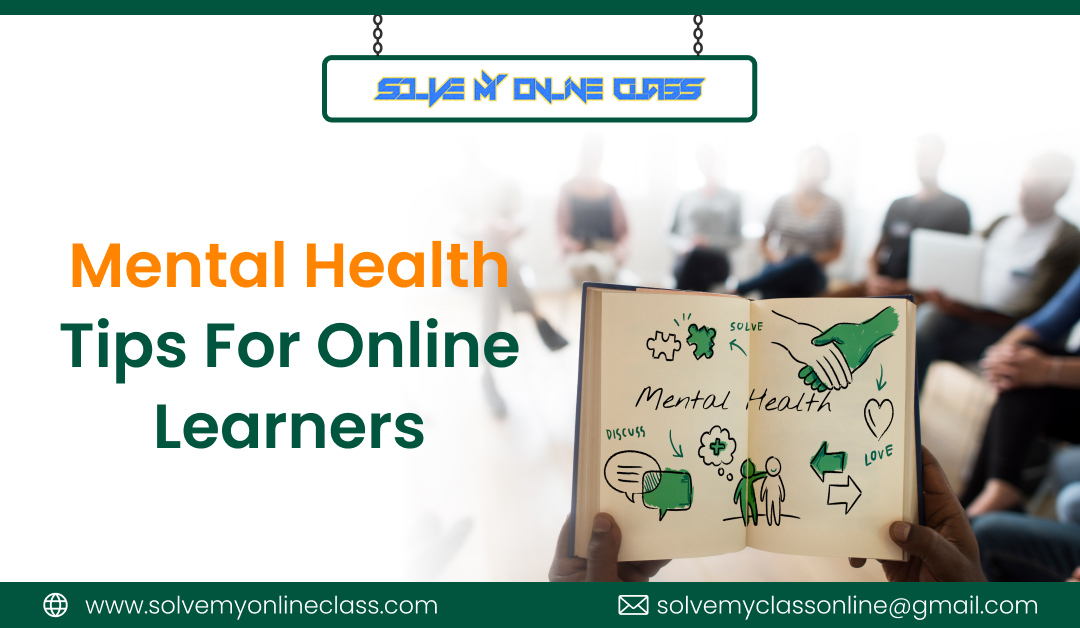Technology breakthroughs and, more recently, the COVID-19 pandemic’s necessity have made the move to online learning a global trend in recent years. Online learning brings special difficulties that can have an impact on mental health even though it offers flexibility and accessibility. Prioritizing your mental health as an online learner is essential to a successful and satisfying educational experience. Here are some helpful pointers for online learners about mental health.
1.Establish a Routine:
The flexibility that comes with online learning is one of its main benefits. This adaptability, though, can occasionally result in an absence of structure, which can be stressful and unsettling. Creating a daily schedule can aid in establishing stability and regularity.
Tips:
Establish a regular wake-up time: To help your body’s internal clock function properly, begin your day at the same time every morning.
Set aside time for study: Set aside specified times of the day to study, and honor them. You’ll be able to efficiently manage your time and avoid putting things off by doing this.
Add pauses: Plan brief relaxation and rejuvenation periods in between study sessions.
2. Create a Dedicated Study Space:
Having a designated study area might help you be more focused and productive. An untidy or boisterous atmosphere can be mentally taxing and distracting.
Tips:
Select a peaceful location: Choose an area of your house that is noise- and distraction-free.
Maintain organization: To lower stress and increase focus, keep your workstation neat and orderly.
Customize your environment: Include cozy furnishings, plants, and inspirational sayings in your study space to create a welcoming and pleasant atmosphere.
3. Stay Connected:
Particularly if you miss the social interactions of a typical classroom setting, online learning can occasionally feel solitary. Maintaining relationships with teachers and classmates is crucial to your emotional well-being.
Tips:
Take part in online discussions: To communicate with your classmates, actively participate in discussion boards, group chats, and class forums.
Participate in online study groups: Work together as a class to encourage one another and exchange ideas and resources.
Interact with teachers: Don’t be afraid to get in touch with your teachers if you need advice, criticism, or just to keep in touch.
4. Use time management techniques:
Managing your time well is essential to juggling the demands of online learning with other obligations. Stress, worry, and burnout can result from ineffective time management.
Tips:
Make use of a planner: Make use of a physical or digital planner to keep track of homework, due dates, and tests.
Establish priorities: Prioritize your work and divide more ambitious objectives into smaller, more doable chores.
Refrain from multitasking: Focus on a single activity at a time to increase output and lower stress levels.
5. Take Care of Your Physical Health:
Mental and physical well-being are intimately related. Taking good care of your body can help you stay happy, lower your stress level, and enhance your mental well-being in general.
Tips:
Regular exercise: Whether you want to work out, do yoga, or go for a stroll outside, make physical activity a part of your everyday schedule.
Consume a diet that is balanced: Give your body the nourishment it needs to maintain healthy brain and energy levels.
Make time for sleep: To make sure you get enough sleep and can concentrate, try to get between seven and nine hours per night.
6. Set Realistic Goals:
You may maintain your motivation and focus by making reasonable and attainable goals for yourself. Anger and low self-esteem can result from unrealistic expectations.
Tips:
Divide up the work: To make bigger jobs less daunting, break them down into smaller, more doable steps.
Honor accomplishments: No matter how tiny, acknowledge and celebrate your victories.
Be adaptable: Be prepared to modify your objectives in light of your circumstances and progress.
7. Set Screen Time Limits:
Overuse of screens can cause headaches, eye strain, and elevated stress levels. Striking a balance between online and offline activity is crucial.
Tips:
Observe the 20-20-20 rule: to lessen eye strain, take a 20-second break every 20 minutes and stare at anything 20 feet away.
Include offline pursuits: Take part in non-screen-related hobbies and pastimes like reading, drawing, or going outside.
Limit the amount of time spent on screens: To make sure you aren’t using your gadgets excessively, set limits for non-academic screen time.
8. Control Your Anxiety and Stress:
Online education can be demanding, particularly when there are other commitments to attend to. Developing good coping mechanisms for stress and anxiety is crucial.
Tips:
Practice mindfulness: To help you relax, try some mindfulness techniques like progressive muscle relaxation, deep breathing, or meditation.
Take regular breaks to rest and rejuvenate yourself. Put down your screen and engage in a fun activity.
Seek assistance: Don’t be afraid to ask friends, family, or a mental health professional for help if you’re feeling overwhelmed.
9. Stay Motivated:
It can be difficult to stay motivated, especially when learning online for extended periods of time. Maintaining your motivation is essential for both your academic and mental well-being.
Tips:
Establish short-term objectives: Divide your long-term objectives into more manageable benchmarks.
Reward yourself: When you finish a task or accomplish a goal, treat yourself to something fun.
Remain upbeat: Rather than concentrating on your mistakes, acknowledge the progress you have achieved.
10. Seek Help When Needed:
It’s critical to know when assistance is needed and to ask for it. Asking for help, be it academic or mental health, is never a sign of weakness.
Tips:
Make use of academic resources: Make use of the writing centers, online tutoring, and other academic support services that your university offers.
Obtain mental health treatments: A lot of schools provide their kids with counseling services. Speak with a therapist or counselor if you are experiencing mental health issues.
Make contact with support systems: Participate in online forums or support groups to exchange experiences and get guidance from people facing comparable circumstances.
Conclusion:
Online learning poses certain difficulties that may have an adverse influence on your mental well-being; however, these difficulties can be successfully overcome with the appropriate techniques. You can keep your mind healthy and succeed in your online learning journey by developing a routine, setting up a dedicated study space, staying connected, practicing time management, managing stress, taking care of your physical health, setting realistic goals, limiting screen time, staying motivated, and asking for help when necessary. Recall that maintaining your mental health is equally as vital as achieving your academic goals, and doing so will help you in every aspect of your life.






